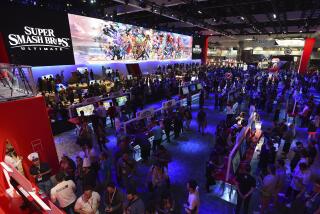Video Game Makers Miss Pull of Key Title
- Share via
No one is ready to declare “game over,” but sales this holiday season of video and computer games are off to a tepid start.
Retailers and game publishers blame the lack of blockbuster titles to lure people into stores and Sony Corp.’s decision not to cut the price of its popular PlayStation 2 console.
Close to half of the $12-billion game industry’s annual sales occur in the last three months of the year. In 2002, retailers logged about $6 billion in game sales from Oct. 1 to Dec. 31.
Analysts differ on what will happen this year. Some predict as much as 8% growth while others forecast a 5% decline. They agree that sales haven’t exactly been swift.
“One of the things merchants are particularly concerned about is that there hasn’t been a pop in software demand,” said John G. Taylor, managing director of Arcadia Investment Corp. in Portland, Ore. “Consumers are being choosy about what they’re buying -- more choosy than expected.”
Analysts emphasize that it’s too early to deliver a verdict for the year and that there could be a rally in the final weeks of the year. But the lackluster start caused investors to throttle back game company stocks in recent weeks.
Shares of Redwood City, Calif.-based Electronic Arts Inc., the world’s biggest independent game publisher, have fallen 15% since the beginning of November. They closed at $42.48 on Monday. Calabasas-based THQ Inc. has fallen 12% to $15.20 in the same time frame, while New York-based Take-Two Interactive Software Inc. dropped 23% to $29.65. All trade on Nasdaq.
“Right now the market is treating game stocks as if they’re in a never-ending spiral downward,” said Stewart Halpern, analyst with RBC Capital Markets in New York. “That may be a bit of an overreaction.”
Most analysts expect the business to grow this year, just not at the double-digit pace of the last several years.
Some cite the absence of a price cut by industry leader Sony of its PlayStation 2 console, which retails for $179. Others note that there is no must-have title, such as last year’s “Grand Theft Auto: Vice City” from Take-Two.
Because PS2 accounts for 63% of the U.S. console market, its popularity has a disproportionate effect on the overall industry. So far this year, sales of the device have lagged behind last year’s levels. Through the end of October, Sony sold 3.5 million PS2s in North America, down 21% from 2002. In November, the company said it sold more than 1 million PS2s, compared with 1.3 million last year.
The figures tripped a domino effect of downward adjustments from game publishers and analysts who had expected the Japanese consumer electronics giant to drop the PS2 price to $149, considered by many in the industry to be the price at which a game console becomes a truly mass-market product.
Sony defended its stance, saying unit sales of the PS2 are 62% ahead of original PlayStation sales at the same point in that product’s life cycle. And 2003 sales of PS2 games were up 7% to $1.6 billion by the end of October, according to a recent report by Harris Nesbitt Gerard, a New York investment bank.
“As such, comparisons to last November’s sales are relatively irrelevant,” said Jack Tretton, a Sony executive vice president. “If price was a significant factor, we would not enjoy a market share that exceeds both our competitors combined.”
Some analysts worry that sales of the PS2, which has reached 22.5 million units sold in North America, may have peaked, even though the console is to remain on the market until at least 2006, when Sony is predicted to launch a PS3.
“You had a bubble last year and the year before driven by ‘Grand Theft Auto 3’ and ‘Vice City,’ ” said Arcadia’s Taylor, who expects the overall industry to shrink 5% this year. “Those two titles represented a balloon in demand.... There’s a chance we’re going to be in a little bit of a hangover from those two years. It’s not clear what’s going to re-energize the market.”
Not all companies are suffering.
THQ is on track to increase revenue 22% in its fiscal year ending March 31. Unit sales of Microsoft Corp.’s Xbox consoles were up 7% from last year during Thanksgiving weekend. Nintendo Co. sold half a million GameCube consoles that weekend, up significantly from last year thanks to a 33% price cut to $99.
And EA’s Chief Financial Officer Warren Jenson predicted that the last three months of the year will be the company’s “biggest quarter in history” in terms of sales and profit.
But if there is modest sales growth of less than 10% this year, fortunes will be unevenly spread.
“There’s no real rising tide,” said Brian Farrell, chief executive of THQ. “Some companies won’t grow at all, and some will grow 20% or more. If you have the right product, the right price and the right level of marketing support, you win.”
More to Read
Inside the business of entertainment
The Wide Shot brings you news, analysis and insights on everything from streaming wars to production — and what it all means for the future.
You may occasionally receive promotional content from the Los Angeles Times.










